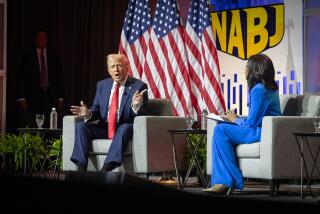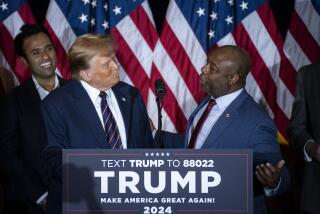Bradley Says He Will Focus on Race Unity
- Share via
NEW YORK — Former New Jersey Sen. Bill Bradley, spotlighting one of the “big ideas” he says will mark his presidential campaign, on Tuesday pledged to make racial unity the centerpiece of his candidacy and, if elected, the most important attribute of his administration.
“If I’m president, I want one thing to be known,” said Bradley, who frequently spoke out on racial issues during his three Senate terms. “If you want to please the boss, one of the things you’d better show is how in your department or agency you’ve furthered tolerance and racial understanding.”
Bradley faces an uphill battle in his quest to wrest the 2000 Democratic nomination from Vice President Al Gore, who has locked down much of his party’s traditional base, including strong support from black leaders. But key to Bradley’s strategy for upsetting Gore is to offer himself as the candidate willing to embrace large issues and challenges while the vice president pushes a less ambitious agenda, such as combating suburban sprawl.
Still, Bradley’s speech detailed no proposals for grappling with the nation’s racial tensions and thus it is unlikely to defuse mounting criticism that apart from touting the idea of “big ideas,” he has provided little beyond generalities.
Candidate Offers Political Guidepost
Previously, for instance, he’s suggested that Democrats should launch new efforts to confront child poverty (an issue he stressed again Tuesday) and expand access to health care, while offering no specific plans. Likewise, Bradley has criticized President Clinton’s decision to sign the 1996 welfare reform bill, and raised questions about the administration’s more recent decision to launch the military intervention in Kosovo, but he has given no indication of what he might do differently.
Bradley has said there will be time to address such differences later in the campaign after voters learn more about his background and basic principles--the kind of guidepost he sought to furnish in Tuesday’s speech.
Bradley choose to deliver his remarks in New York to draw particular attention to what he described as “his personal and moral” commitment to racial healing. The city has been rocked by almost daily protests over the recent shooting death by four white police officers of Amadou Diallo, an unarmed, 22-year-old West African immigrant.
Standing before a group of students at Cooper Union College in lower Manhattan, where Abraham Lincoln signaled his intentions in 1860 to run for president on an anti-slavery platform, Bradley cited the Diallo shooting as an example of racial misunderstandings that threatens the nation.
“The reason the Diallo event ignited immediate outrage in the black community is that it was only an extreme example of the targeting that most Americans have experienced with the police at some time in their lives,” he said. “Unfortunately, in America we have constructed a society in which the deadwood of superstition, fear and fantasy continues to stave off racial understanding.”
Young Americans, he said, can no longer allow racial divisions to continue to tear the nation apart.
Bradley Talks of ‘Racial Healing’
“The need for racial healing should be a common sense impulse,” he said, noting that the U.S. population is rapidly becoming a nonwhite mixture of races, ethnic groups, languages and religions. “The economic future of the children of white Americans will depend increasingly on the talents of nonwhite Americans. That’s not ideology; that’s demographics.”
He called upon Americans of all races to push for programs that improve the welfare of poor children as a way to ease racial tensions, given that 40% of such youths are black.
“The best way to get beyond the divisions and tensions is to unite for a deeply felt common goal,” Bradley said. Such an effort on behalf of poor children, he said, would serve as the “North Star” of his administration.
Eric Hauser, a spokesman for the Bradley campaign, said race relations has been at the core of Bradley’s personal concerns since he played professional basketball in the late 1960s and ‘70s for the New York Knicks. “He thinks this is the largest moral issue we face and there’s not nearly enough attention being given to it,” Hauser said.
Bradley said speaking out on race is a way for him to demonstrate presidential leadership. Turning directly to the college students in his audience, he challenged them to make racial healing a part of their personal struggles. He told them that he confronted the issue in reconciling his love for an aunt who often made racist comments about his black teammates.
“The conflict was never resolved,” he said.
More to Read
Get the L.A. Times Politics newsletter
Deeply reported insights into legislation, politics and policy from Sacramento, Washington and beyond. In your inbox twice per week.
You may occasionally receive promotional content from the Los Angeles Times.










